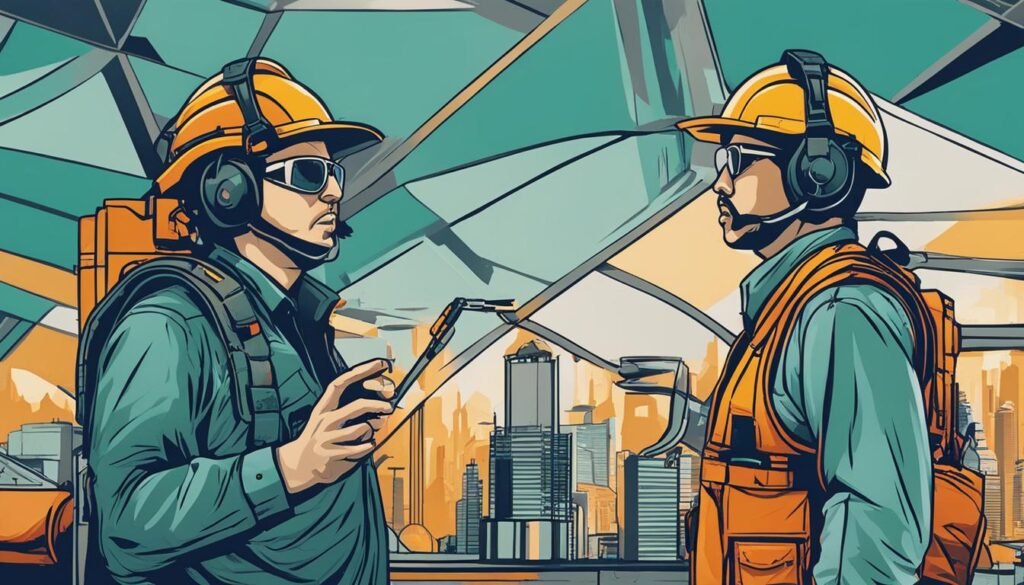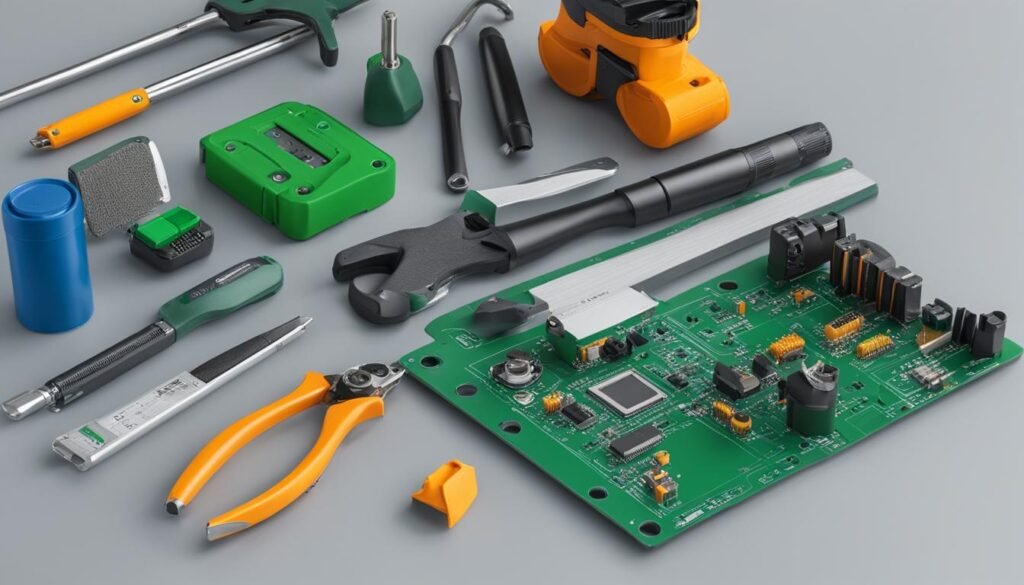A technical advisor is a valuable resource for your projects. They bring expertise in IT and technology, providing support and guidance to ensure success. Whether you need assistance with technical issues, project management, or strategic solutions, a technical advisor can provide the expertise you need. They are experts in various fields, such as IT consulting, technology support, and specialized knowledge in specific areas. With their help, you can navigate the complex world of technology and make informed decisions for your projects.
Key Takeaways:
- A technical advisor is a valuable resource for projects, providing expertise in IT and technology.
- They offer support and guidance in areas such as technical issues, project management, and strategic solutions.
- Technical advisors are experts in various fields, such as IT consulting and technology support.
- They can help navigate the complexities of technology and make informed decisions.
- Hiring a technical advisor can ensure the success of your projects.
Roles and Responsibilities of a Technical Advisor
A technical advisor plays a vital role in providing technical support and guidance to customers and clients. Their responsibilities encompass a wide range of duties, leveraging their expertise to ensure the smooth functioning of various technical aspects.
“Technical advisors often have specialized knowledge in information technology or specific applications. Their role extends beyond simply resolving technical issues. They are also adept at analyzing business operations and providing valuable insights and recommendations.”
As a technical advisor, one of their primary tasks is diagnosing and resolving technical problems. They possess the ability to provide clear instructions and explanations to customers, addressing their concerns effectively. In more complex cases, technical advisors have the responsibility to escalate the issues to higher management or senior technical staff.
In addition to their technical expertise, technical advisors often play a vital role in project management. They contribute their insights and expertise to ensure successful project completion, meeting both technical requirements and client expectations. Their duty extends to monitoring and optimizing day-to-day business operations, offering suggestions for improvement and efficiency.
Sample Table: Technical Advisor Responsibilities
| Responsibilities | Description |
|---|---|
| Provide Technical Assistance | Offer expert guidance and support to customers, resolving technical issues promptly. |
| Analyze Business Operations | Identify areas for improvement and provide recommendations to optimize workflows. |
| Specialize in a Field of Expertise | Develop proficiency in specific areas such as information technology or application support. |
| Collaborate with Team Members | Work closely with colleagues to ensure coordinated support and cohesive solutions. |
| Provide Technical Expertise | Utilize in-depth technical knowledge to offer expert advice and resolve complex issues. |
Technical advisors possess excellent customer service skills, enabling them to provide exceptional support and build strong relationships with clients. They are often the primary point of contact for technical inquiries, providing the necessary information and assistance to ensure customer satisfaction.
To excel in this career, technical advisors must continuously enhance their skills and stay up-to-date with the latest advancements in information technology. They need to specialize in specific fields of expertise, analyze technical issues, and devise appropriate solutions to meet the unique requirements of each situation.
The day-to-day responsibilities of a technical advisor may vary depending on their area of specialization, the nature of the projects they are involved in, and the organization they work for. Nonetheless, their role is crucial in providing technical expertise and assistance to ensure the smooth operation of business activities.
Skills and Qualifications of a Technical Advisor
Technical advisors require a combination of technical expertise and soft skills to excel in their role. They must possess strong technical knowledge and skills relevant to their area of specialization to provide expert guidance and solutions to clients. Technical expertise is a crucial aspect of their role, ensuring that they have the necessary proficiency in their field of advising.
“Technical expertise is the foundation of every competent technical advisor. It enables them to offer reliable and informed advice to clients and customers.”
Communication skills are equally important for technical advisors. Effective communication allows them to clearly and efficiently convey technical information to clients and customers, ensuring a smooth understanding of complex concepts and solutions.
In addition to technical expertise and communication skills, technical advisors need to possess attention to detail and multitasking abilities. These skills enable them to handle multiple tasks simultaneously while maintaining a high level of accuracy in their work.
Leadership roles may also be part of a technical advisor’s responsibilities. This requires them to provide direction and guidance to teams or clients, leveraging their technical knowledge and skills in a leadership capacity.
Listening skills play a crucial role in understanding client needs and requirements. By actively listening and absorbing information, technical advisors can tailor solutions that best meet the specific needs of their clients.
Soft skills are also important for technical advisors. They include qualities such as insight, efficient communication, and maintaining strong relationships with clients. These skills enable technical advisors to provide exceptional support and ensure client satisfaction throughout the advisory process.
Key Skills and Qualifications of a Technical Advisor:
- Strong technical expertise and knowledge
- Excellent communication skills
- Attention to detail and multitasking abilities
- Leadership roles and responsibilities
- Effective listening skills
- Insight and efficient communication
- Maintaining strong relationships with clients

| Skills | Qualifications |
|---|---|
| Technical expertise | Relevant certifications, advanced degrees, industry experience |
| Communication skills | Ability to convey technical concepts clearly and succinctly |
| Attention to detail | Keen eye for accuracy and precision |
| Multitasking abilities | Efficiently handle and prioritize multiple tasks |
| Leadership roles | Past experience in leading teams or projects |
| Listening skills | Active listening and understanding of client needs |
| Soft skills | Insight, efficient communication, and relationship-building |
The combination of technical expertise, communication skills, attention to detail, multitasking abilities, leadership roles, listening skills, and soft skills ensures that technical advisors can provide exceptional technical advisory services and consulting to their clients. By leveraging their knowledge and skills, technical advisors offer expert advice and guidance for efficient and effective solutions.
Benefits and Challenges of Being a Technical Advisor
Becoming a technical advisor offers a range of benefits and presents unique challenges. This career path allows individuals to leverage their technical expertise and skills to assist clients and customers. Technical advisors also have the opportunity to continuously learn and stay updated on emerging technologies, keeping their knowledge and expertise relevant in an ever-evolving industry.
When it comes to salary, technical advisors can expect a competitive average salary. According to data from Zippia, the average technical advisor salary is well-aligned with the level of technical expertise and customer-service skills required for the role.
While being a technical advisor has its benefits, there are also several challenges to navigate. Technical advisors often encounter frustrated customers who are facing technical issues, requiring patience and effective communication skills to provide support and resolve problems. Additionally, technical advisors must handle multiple and complex issues simultaneously, requiring exceptional multitasking abilities and a highly technical aptitude.
Furthermore, staying up to date with rapidly changing technologies can be challenging. Technical advisors need to proactively seek opportunities for continuous learning and development to maintain their technical expertise and effectively serve their clients.
Another aspect that technical advisors need to balance is their work-life integration. The demands of the role can sometimes require long hours and a high level of commitment. It is crucial for technical advisors to strike a balance between their professional and personal lives while still staying at the forefront of their field.
Overall, being a technical advisor offers a rewarding career where professionals can utilize their technical expertise and assist clients in navigating the complexities of technology. Though there are challenges to overcome, the combination of technical know-how, customer-service skills, and ongoing learning opportunities make the role of a technical advisor an exciting and fulfilling choice.

| Benefits of Being a Technical Advisor | Challenges of Being a Technical Advisor |
|---|---|
| Rewarding career using technical skills and expertise | Dealing with frustrated customers |
| Continuous learning and staying updated on emerging technologies | Handling multiple and complex issues simultaneously |
| Competitive average salary | Keeping up with rapidly changing technologies |
| Striking a balance between work and personal life |
Technical Advisor Skills and Qualifications Overview
To become a technical advisor, certain skills and qualifications are necessary. Employers often prefer candidates with a bachelor’s or master’s degree in a relevant field, such as computer science or information technology.
Technical advisors are expected to have a strong technical background, as well as the ability to provide technical assistance and support. Their job description includes diagnosing and resolving technical issues, providing expertise and guidance, and ensuring customer satisfaction.
Continuous skill updates and staying current with industry developments are crucial for a successful career as a technical advisor.
Key Qualifications for a Technical Advisor:
- Bachelor’s or Master’s Degree: Preferred in a relevant field, such as Computer Science or Information Technology.
- Strong Technical Background: Ability to provide technical assistance and support to clients.
- Analytical and Problem-Solving Skills: Diagnosing and resolving technical issues.
- Expertise: Providing guidance and expertise to clients.
- Excellent Communication: Ensuring effective communication with clients and colleagues.
Having a combination of technical skills and the ability to provide top-notch customer service is key for a successful career as a technical advisor.

A technical advisor’s resume should highlight their educational background, relevant certifications, technical skills, and hands-on experience in their field of expertise. Additionally, showcasing strong problem-solving abilities, effective communication skills, and a track record of customer satisfaction can set them apart from other candidates.
Technical Advisor Skills and Expertise
Technical advisors possess a range of skills and expertise that enable them to excel in their role. They combine both technical and soft skills to provide efficient and effective technical advisory services and technology solutions to clients.
Technical Advisor Skills Summary
When it comes to hard skills, technical advisors commonly possess expertise in the following areas:
| Technical Advisor Hard Skills |
|---|
| Java |
| Customer service |
| Provisioning |
| Technical support |
| Project management |
These hard skills are essential for diagnosing and resolving technical issues, providing support to customers, and efficiently managing projects.
In addition to hard skills, technical advisors also require soft skills to effectively communicate with clients and provide the best solutions. Some of these soft skills include:
- Customer-service skills
- Listening skills
- Problem-solving skills
Soft skills enable technical advisors to understand clients’ needs, establish strong relationships, and offer professional insights.
Field of Expertise and Insight
Technical advisors are highly technical professionals who specialize in a specific field of expertise. This specialization allows them to provide valuable insight and expertise to clients. Whether it is in information technology, network management, or software development, technical advisors offer in-depth knowledge and practical solutions tailored to the unique challenges of their clients.
“Technical advisors are problem solvers, combining their highly technical skills with their field expertise to provide efficient and effective solutions to their clients.”
By maintaining a strong grasp on emerging technologies and industry trends, technical advisors stay at the forefront of their field, offering the most up-to-date and innovative technical advisory services and technology solutions.

Technical Advisor vs. Other Related Roles
While the role of a technical advisor shares similarities with other related roles such as IT consultant, technology consultant, technical support specialist, and IT advisor, there are distinct differences between them. Each role focuses on providing technical guidance and support, but the specific responsibilities may vary.
Technical advisors are experts in a specific field of knowledge and offer advice and solutions based on their expertise. They possess a deep understanding of their specialization, allowing them to provide tailored technical assistance to clients and customers. Technical advisors excel in diagnosing complex technical issues and providing strategic recommendations, leveraging their extensive experience and expertise.
IT consultants and technology consultants offer broader consulting services related to IT and technology. They work closely with clients to analyze their IT infrastructure and make recommendations for improvements, efficiency, and technology adoption. IT consultants and technology consultants focus on delivering comprehensive solutions and strategic IT planning to help clients achieve their business goals.
Technical support specialists specialize in providing technical support and troubleshooting issues. They assist customers with resolving technical problems, addressing software and hardware issues, and offering step-by-step guidance for issue resolution. Technical support specialists typically work in direct customer-facing roles, offering immediate assistance and ensuring customer satisfaction.
Also read : Gain Skills with Technical Writing Certification
IT advisors provide strategic advice and guidance on IT solutions. Their focus is on aligning technology with business objectives and maximizing IT investments. IT advisors assess an organization’s IT infrastructure, evaluate technology solutions, and provide recommendations for improving efficiency, security, and productivity. They play a vital role in guiding businesses through technology transformations and digitalization.
| Role | Description |
|---|---|
| Technical Advisor | Experts in a specific field, providing tailored technical assistance and strategic recommendations. |
| IT Consultant | Offer broader consulting services related to IT infrastructure and technology planning. |
| Technology Consultant | Provide comprehensive solutions and strategic IT planning for businesses. |
| Technical Support Specialist | Specialize in providing technical support and troubleshooting issues for customers. |
| IT Advisor | Provide strategic advice and guidance on IT solutions and technology transformations. |
Each role requires a unique set of skills and expertise, but the ultimate goal is to provide technical assistance and expertise to clients and customers. Depending on the specific needs of a project or organization, hiring a technical advisor, IT consultant, technology consultant, technical support specialist, or IT advisor can bring valuable insights and guidance, ensuring the successful implementation of technical solutions and achieving desired outcomes.

Conclusion
In conclusion, a technical advisor plays a crucial role in providing technical support, expertise, and guidance to clients and customers. They possess a combination of technical skills and soft skills, allowing them to diagnose and resolve technical issues, provide excellent customer service, and offer strategic solutions. Technical advisors have extensive knowledge and expertise in their field, allowing them to excel in their role.
From implementing technology solutions to providing ongoing support, technical advisors play a vital role in ensuring the success of projects. Their ability to analyze complex technical issues, provide expert advice, and offer innovative solutions make them invaluable assets to any organization. Their skills and qualifications, including a strong technical background and effective communication abilities, enable them to effectively fulfill the responsibilities of a technical advisor.
If you’re seeking a technical advisor for your projects, their expertise and experience will prove essential in overcoming technical challenges and guiding your team towards success. Their ability to adapt to changing technologies, provide timely support, and offer technical advisory services can make all the difference in achieving your project goals. So, whether you require assistance with technical implementation, strategic planning, or ongoing support, hiring a skilled technical advisor is the key to ensuring a smooth and successful journey.
FAQ
Q: What is the job description of a technical advisor?
A: A technical advisor provides expertise and guidance to clients or colleagues in various technical fields such as IT, engineering, or finance. They may provide support, solve technical issues, and often interact with customers via exceptional customer service.
Q: What skills are required for a technical advisor career?
A: Skills for technical advisors typically include exceptional customer service, problem-solving abilities, business development, and the ability to develop applications or support computer systems. Additionally, they must be able to take initiative and have a good understanding of business practices in their specific field.
Q: What is the average salary of a technical advisor?
A: The average technical advisor salary can vary depending on the industry and location, but the national average salary is around $80,000 per year.
Q: What education is needed to become a technical advisor?
A: Technical advisors typically need a bachelor’s degree in a relevant field such as IT, engineering, finance, or healthcare. Some positions may require specific certifications or credentials in addition to formal education.
Q: What are the main responsibilities of a technical advisor?
A: Main responsibilities of a technical advisor may include providing technical support, interacting with customers, developing and implementing technical solutions, and contributing to the daily operations and business practices of an organization.
Q: Can a technical advisor work as a consultant?
A: Yes, a technical advisor can work as a consultant, offering technical expertise and guidance to clients on a project basis, or through a consulting firm.
Q: What is the overview of the daily operations for a technical advisor?
A: Daily operations for a technical advisor may involve providing technical support, developing solutions, interacting with customers, and contributing to business development and problem-solving initiatives within an organization.
Q: What are the key skills needed for a successful technical advisor resume?
A: A successful technical advisor resume should highlight skills such as exceptional customer service, technical expertise, problem-solving abilities, business development, and the ability to develop applications or support computer systems.
Q: What are the typical interaction points for a technical advisor with customers?
A: Technical advisors typically interact with customers via various channels such as in-person support, phone or email support, and may provide technical assistance or guidance to customers for any technical issues or inquiries.
Q: How can a technical advisor progress in their career?
A: Technical advisors can progress in their career through continuous education, gaining relevant certifications, building expertise in their field, and demonstrating strong problem-solving, customer service, and business development skills in their roles.

